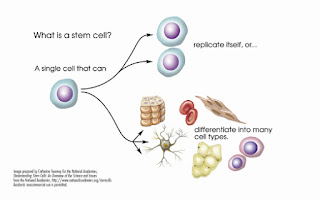There
is exciting and innovative research and progress occurring related to the
potential of many types of stem cells for slowing MS disease activity and for
repairing damage to the nervous system. In light of the urgent need for more
effective treatments for MS, particularly for those with more progressive forms
of the disease, we believe that the potential of all types of cell therapies
must be explored.
Stem
cell therapy is any treatment
that uses or targets stem cells, which are the types of cells that
differentiate into many different specialized cells in our bodies. Stem cells
are found in both embryos and adults.
Many
types of stem cells are being explored for their potential benefits for
treating multiple sclerosis. Only when the results of these and subsequent
clinical trials are available will it be possible to determine what the optimal
cells, delivery methods, safety and actual effectiveness of these current
experimental therapies might be for people with MS.
Although cell based therapy has generated a great deal of interest and holds promise, the field is in its infancy and much more research is needed before cell based therapies become a MS treatment option.
Although cell based therapy has generated a great deal of interest and holds promise, the field is in its infancy and much more research is needed before cell based therapies become a MS treatment option.
Different Types of Stem Cells
- HSCs (haematopoietic stem cells) – adult stem cells that are found in bone marrow and blood. HSCs are capable of producing all of the cells that make up the blood and the immune system.
- MSCs (mesenchymal stem cells) – adult stem cells found in several places in the body, including the bone marrow, skin and fat tissue. They produce cells which help other stem cells function properly.
- NSCs (neural stem cells) – specialized stem cells responsible for repairing nerve-insulating myelin in the brain. These can be derived from other types of stem cells such as mesenchymal cells.
- hESCs (human embryonic stem cells) – stem cells derived from donated embryos. They can naturally produce every type of cell in the body. One concern about their potential therapeutic use is that they have been found to cause tumors.
- iPSCs (induced pluripotent stem cells) are engineered from adult cells to produce many types of cells. One concern about their potential therapeutic use is that they have been found to cause tumors.
National Multiple Sclerosis Society. www.NMSS.org


No comments:
Post a Comment